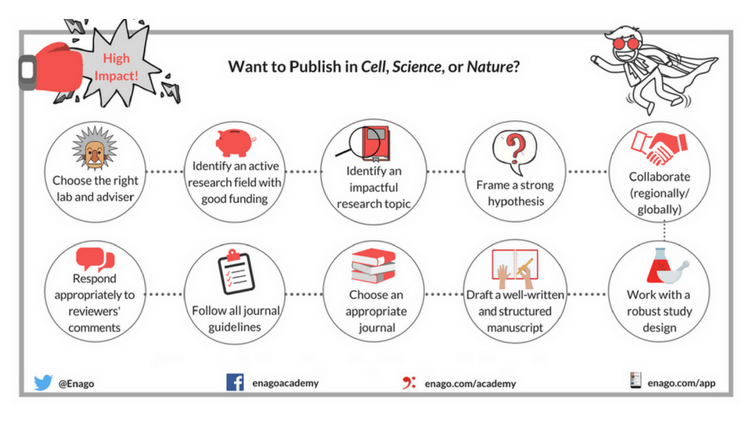Tackling Common Problems in Scientific Publication

Research publication in a peer-reviewed journal is considered to be a significant milestone in any researcher’s career. A publication indicates the researcher’s interest in the field as well as the contribution to the field of science. The publication cycle can be quite daunting for early stage researchers as they try to figure out the best approach to submitting and eventually publishing their manuscripts. Early stage researchers find it challenging to understand the nuances of scientific publication. This article is to guide authors through the publication process and highlight the best practices while setting out to publish research.
Manuscript Formatting
It is important to note that journals lay out their own specific format and style of presenting manuscripts. This information is highlighted in the “guidelines for authors” section on the journal website. Journals have a specific format and word counts for different article types. Authors must read through the instructions carefully and ensure that the manuscript adheres to the format and style guidelines. Particular attention to reference formatting as well as the artwork guidelines as manuscripts are often rejected or returned to the authors if the journal-specific guidelines are not met. Authors must ensure that the manuscript is written in a clear and concise manner, avoiding repetitive information.
Authorship
Author order is an important part of manuscript writing and publishing process. In the author list, the first author is considered to be the primary author. The order in which the authors should be listed is often up for debate, which may lead to ethical issues at a later stage.
Most journals expect authors to follow The International Committee of Medical Journal Editors (ICMJE) criteria for Authorship1. Contributors who meet all the criteria defined by ICMJE can be listed as authors. Authors should have made all of the following contributions:
- Substantial contributions to the conception or design of the work; or the acquisition, analysis, or interpretation of data for the work;
- Drafting the work or revising it critically for important intellectual content;
- Final approval of the version to be published;
- Agreement to be accountable for all aspects of the work in ensuring that questions related to the accuracy or integrity of any part of the work are appropriately investigated and resolved.
It is considered unethical to list individuals who do not meet all the above criteria as authors. This would amount to scientific misconduct and unethical behavior. Non-adherence to the authorship guidelines can lead to retraction of the publication.
Resolving Authorship Issues
There are cases when researchers do not reach a consensus regarding the author list. It is advisable to approach the respective institutions for assistance in such situations.
In case there is ambiguity about authorship, it is best to contact the journal editorial team with their queries. The journal would then suggest the best approach. To learn more about issues related to ethics, it is best to follow the guidelines defined by COPE.
Conflict of Interest
Also known as author disclosures, conflict of interest is when an individual is involved in certain activities or is with organizations, financially or otherwise, which might potentially affect the individual’s professional decisions. Both individuals and organizations can have conflicts of interests, and everyone related to the academic publication cycle (authors, editors, reviewers) is affected by it. The various types of conflict of interest have been outlined below. It is critical for authors to identify, disclose, and if possible, avoid all such issues.
Professional Relationships
Authors may share professional connections with editors and sometimes even reviewers. This might affect the assessment of the manuscript for said reasons. Therefore, it is important for authors as well as editors and reviewers to declare their interests.
Commercial Relationships
Scientific collaborations usually mean that authors usually receive research grants or funding or any other form of financial support from organizations for the research conducted. It is critical that authors disclose any financial gains of this nature while submitting their manuscript as potential conflicts of interests.
Personal Relationships
Personal relationships, for obvious reasons, have an impact on the outcome of the research and eventually, the publication of the article. It is preferable to disclose any such relationships at the time of manuscript submission. During the submission process, several journals provide authors with the option of suggesting or opposing reviewers provided the authors in order to avoid conflicts.
Communicating with the Editor
Authors are required to communicate with the journal’s editorial staff during various stages of the manuscript submission process. It is essential for researchers to be able to communicate well with the editors and the journal staff. The communication should be well written and must have a professional tone. Many journals consider pre-submission inquiries. This is beneficial to the authors as they provide the authors with constructive feedback which would help them improvise the draft. Authors must include a proposed title, a short abstract or summary of the research, outlining the significance and contribution of the research.
Cover letters form an integral part of the manuscript submission process. Authors should ensure to include details of conflicts of interest, ethical approval, and previous submissions or publications (if any).
All queries from the editorial team should be addressed in a straightforward manner so that all the issues highlighted are resolved.

Reference:
- ICMJE Guidelines (2017) Defining the Role of Authors and Contributors. Retrieved from http://www.icmje.org/recommendations/browse/roles-and-responsibilities/defining-the-role-of-authors-and-contributors.html










Predatory journals may, by chance, contain groundbreaking articles.
Internationally recognized Journals, being so demanding in their submission procedures, may reject and lose so many groundbreaking articles to predatory journals.